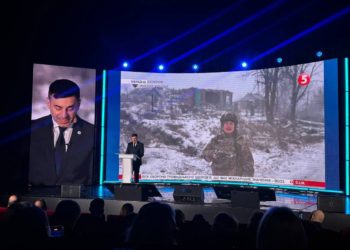Newspapers are as important as bread and water, says Lina Kushch, the First Secretary of the National Union of Journalists of Ukraine (NUJU). Mariia Kalus, a reporter for German radio station WDR, met her during a visit to Berlin and discussed journalism in wartime.
Lina Kushch sits at a table in her Berlin apartment. In her hands is a fresh newspaper from Myrnohrad, a town right on the front line in the Donetsk Region.
“There is fierce fighting there, and everyone has been urged to leave the settlement,” says Lina Kushch.
Ridne Misto is the name of the newspaper. On the cover page are photos of destroyed houses, and special thanks are due to Germany.
“We thank the German Journalists’ Association for the support that made this issue possible,” emphasizes Lina Kushch.
Last year, the German Journalists’ Association launched a special fundraising campaign for Ukrainian media from front-line cities. In May, the money reached the newsrooms. In total, twelve local newspapers from front-line areas can continue to be published thanks to donations.
Without this support, some Ukrainian newspapers would no longer exist, because important sources of income, such as advertising, have disappeared. Because no one wants to advertise in the front-line zone.
“There are no longer opportunities for such cooperation, and it is often difficult to sell the newspaper somewhere for money,” says Lina Kushch.
The editorial staff of Ridne Misto was forced to leave Myrnohrad. Their newspaper is primarily received by internally displaced persons from the region, and the military delivers it to the few residents who have remained in their homes. People kiss the newspaper when they receive it.
A small gesture with great meaning. Without stable radio communication, internet, and electricity, people in front-line areas do not receive up-to-date information. And so rumors arise quickly.
“The newspaper is all the more important, also from a moral point of view,” Lina Kushch emphasizes.
“People perceive it as a sign that the Ukrainian authorities continue to work. And it is also a symbol, a sign for Ukraine,” she says.
Enthusiasm, hope, and the will to resist are also what keep many newsrooms afloat. According to the NUJU, a quarter of Ukrainian regional journalists work without a salary. Most local newsrooms have a monthly budget of just over EUR 2,000.
“Journalism is not very profitable during war. It is more of a mission than an opportunity to make money,” says Lina Kushch.
In addition, the work becomes increasingly dangerous again and again. The NUJU observes that their colleagues are constantly becoming targets of direct russian attacks. The designation “Press” on cars and bulletproof vests does not protect.
“We have experienced several cases when russian drones attacked a car with journalists. We also see a trend when russia targets hotels where journalists regularly stay overnight. In cities on the front line, it attacks them with missiles and drones,” says Lina Kushch.
Since February 2022, a total of 18 journalists have been killed while reporting in Ukraine. At least 30 Ukrainian colleagues are in russian captivity. The First Secretary of the NUJU demands their immediate release and accuses russia of violating international law.
“But russia uses the opportunity to hold them as a means of exchange, as hostages. It does whatever it wants with journalists, and even kills them, as happened with Victoria Roshchina,” emphasizes Lina Kushch.
During the exchange, russia handed over the body of a Ukrainian journalist with the most severe signs of abuse and torture. In addition, she was missing several organs, such as her eyes, larynx, and parts of her brain. The 27-year-old journalist was investigating torture prisons in russian-occupied territories and was arrested in the summer of 2023. This case also attracted international attention.
Tired but full of hope, Lina Kushch looks at the Ridne Misto newspaper on her table. She knows that this war requires a long breath.
But one thing is certain for her.
“This newspaper is like bread, because it is needed like bread, like water. Verified information from journalists is also needed. That is what is missing,” Lina Kushch concludes.

 THE NATIONAL UNION OF
JOURNALISTS OF UKRAINE
THE NATIONAL UNION OF
JOURNALISTS OF UKRAINE
















Discussion about this post